Blind climber edges closer to Paralympics dream
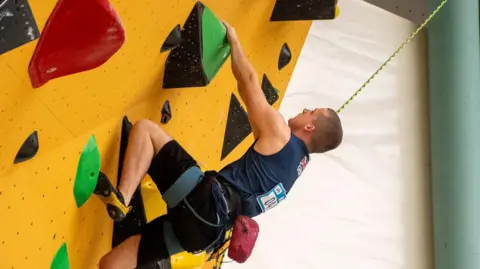 PA Media
PA MediaA blind climber who scales 25m (82ft) walls using touch and his brother's spoken directions has raised £14,000 towards his dream of competing at the 2028 Paralympics.
Lux Losey-Sail, 21, from London, started climbing aged nine a few years after being diagnosed with Stargardt disease – a genetic condition which causes loss of central vision.
Since joining the GB Paraclimbing Team as its youngest member at the age of 15, he has consistently earned podium spots in international competitions.
He has set up an online fundraiser to cover his training and travel with the hope of being able to compete in the first ever para-climbing events at the next Paralympic games in Los Angeles.
Mr Losey-Sail works as a climbing instructor at the Castle Climbing Centre in Hackney, east London, and climbs with the assistance of his "sight guide" brother Max, 25, who helps him using a radio headset.
"As visually impaired climbers, we're not going to know what specific holds are," the 21-year-old said.
"When they're guiding you, they're giving you specifics on what type of hold is coming up, or the sequence of how to do the climb."
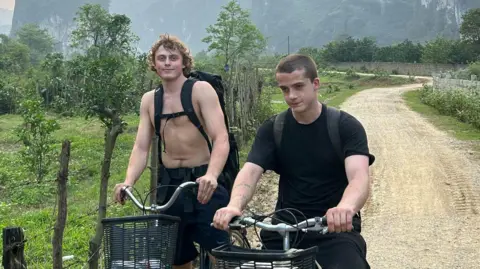 PA Media
PA Media"It's working as a team," he continued. "They need to be on it and make sure that they're giving you the correct amount of information."
He added: "I love being up high.
"I'm not afraid of heights, and I'm always connected to a rope so I know that even if I fall I'll be caught.
"It's something I'm so used to that I don't even register it any more."
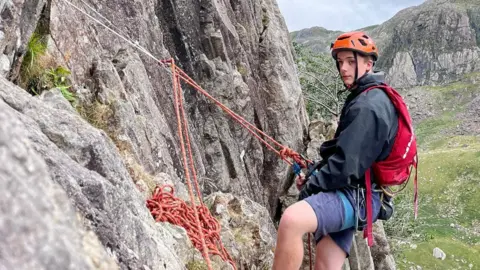 PA Media
PA MediaMr Losey-Sail was diagnosed with Stargardt disease when he was seven years old, which he said means he has no central vision and can't see at a distance.
He said what fully sighted individuals can see at 60m (197ft), he can just about make out at 3m (10ft).
"If I'm sitting across from someone at a table, I can't see their face clearly," he said.
"I'll be able to distinguish who it might be, but I won't be able to tell you their specific facial features.
"At this point, I don't remember what it's like to see with full sight."
Mr Losey-Sail started climbing at the age of nine thanks to the Short Breaks scheme, which gives disabled children access to various activities.
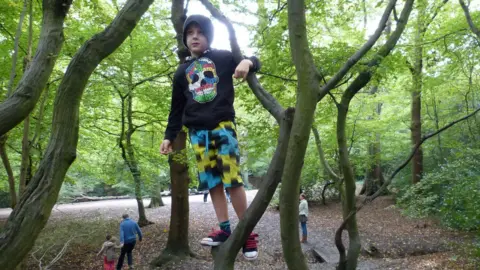 PA Media
PA MediaHe soon began competing in regional competitions, but was the only child there with a disability. "It felt lonely and disheartening because obviously children at that age don't understand," he said.
"But you can't blame any of the kids for it, because they're just children."
He added: "When you're on the actual wall, for me, everything else disappears.
"It's just the wall, my sight guide, and me. I don't really register much from the outside."
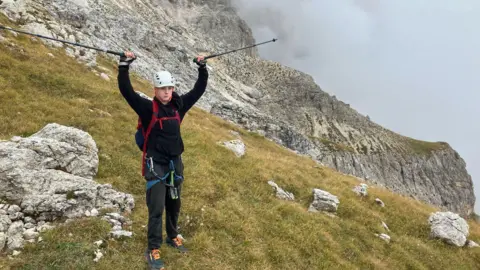 PA Media
PA MediaAfter multiple podium finishes, Lux was on his way to the Paraclimbing World Cup in Italy last September when he was told there were no sight guides available to help him.
"I was scrambling to try and find someone, and then my brother just put his hand up and said 'I'll help you'," he recalled.
The climber went on to earn a silver medal.
Although he is preparing for several international competitions this year, Mr Losey-Sail's ultimate goal is to compete in Los Angeles in 2028.
The International Paralympic Committee is set to announce which para-climbing categories will qualify by December.
After reaching his fundraising goal of £12,000 in just one week, he has now raised more than £14,000 and said he was grateful to everyone who supported him.
"I've always wanted to push myself to be the best that I can be," he added.
"Regardless of if it's a disability or mental health issues or whatever, human beings are resilient.
"Anything can be, if you put your mind to it. I really try and align myself with that mentality."
Listen to the best of BBC Radio London on Sounds and follow BBC London on Facebook, X and Instagram. Send your story ideas to [email protected]
